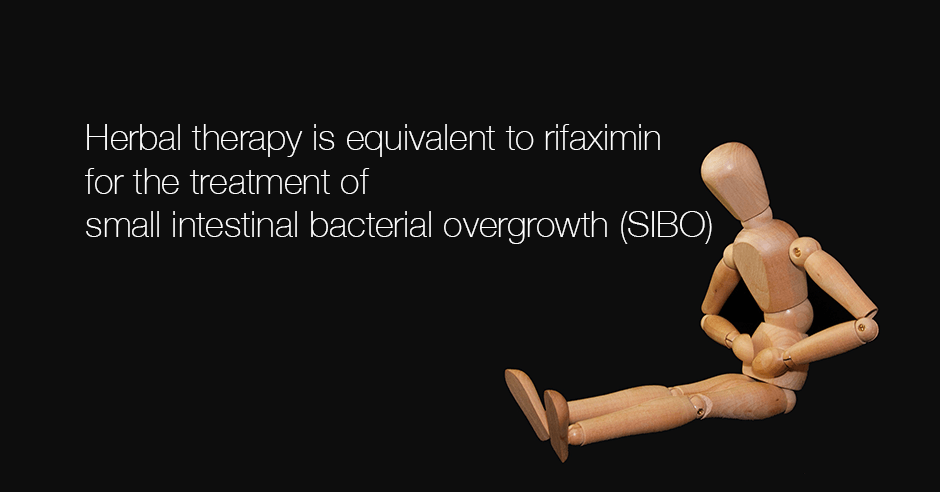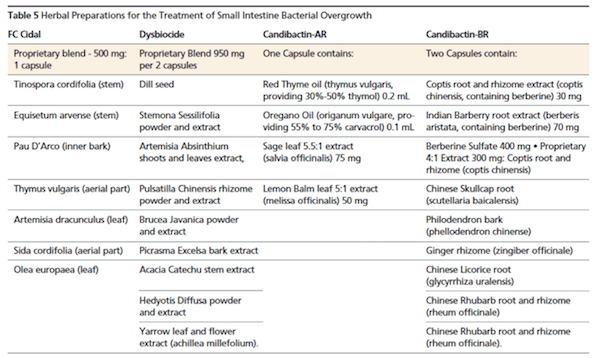
Despite the fact that this paper was published in 2014, it’s still very relevant and I’m just behind in sharing it via a blog post: Herbal therapy is equivalent to rifaximin for the treatment of small intestinal bacterial overgrowth
Patients with small intestine bacterial overgrowth (SIBO) have chronic intestinal and extraintestinal symptomatology which adversely affects their quality of life. Present treatment of SIBO is limited to oral antibiotics with variable success. A growing number of patients are interested in using complementary and alternative therapies for their gastrointestinal health. The objective was to determine the remission rate of SIBO using either the antibiotic rifaximin or herbals in a tertiary care referral gastroenterology practice.
I’ve also decided to post this study now because I’ve been dealing with chronic SIBO for some time and am in the middle of doing the Metagenics herbal protocol (more information on that below).
SIBO symptoms and conditions
Here is a summary of some of the chronic intestinal symptoms: Abdominal bloating (gas), belching, flatulence, abdominal pain, cramps, constipation and/or diarrhea, heartburn (reflux or GERD), nausea and food sensitivities.
Here is a summary of some of the extraintestinal (outside the intestinal system) symptoms and conditions that have been linked to SIBO and/or dysbiosis: disorders of mood and behavior (including anxiety), diabetes, obesity, cardiovascular disease, rosacea, restless legs syndrome, pain, anemia, interstitial cystitis, and other pelvic conditions such as vulvodynia and proctalgia fugax (rectal spasms), chronic prostatitis and polyneuropathy.
During season 3 of The Anxiety Summit, I interviewed Dr. Allison Siebecker on Small Intestinal Bacterial Overgrowth and Anxiety. We talked about the SIBO Questionnaire I use with my clients and she gave me permission to share my modified version. You can find this SIBO questionnaire here. Please check out Dr. Siebecker’s site siboinfo.com for a wealth of information about SIBO.
The herbal treatments in this study
In this study, one hundred and four patients who tested positive for newly diagnosed SIBO by lactulose breath testing were offered either 1200mg rifaximin a day or one of two herbal treatments for 4 weeks. Lactulose breath testing was done again at the end of the treatment.
These are the two herbal treatments that were offered:
Dysbiocide and FC Cidal (both by Biotics Research): take 2 capsules twice daily of each of these products
or
Candibactin-AR and Candibactin-BR (both by Metagenics): take 2 capsules twice daily of each of these products

The ingredients in each of the products
(from the paper: Herbal therapy is equivalent to rifaximin for the treatment of small intestinal bacterial overgrowth)
Study conclusion
The study concluded that these herbal therapies are at least as effective as rifaximin for resolution of SIBO. It also states that the herbal products also appear to be as effective as triple antibiotic therapy in patients who don’t respond to rifaximin.
Adverse effects
With regards to adverse effects, they were reported as follows: in the rifaximin treated patients there was 1 case of anaphylaxis, 2 cases of hives, 2 cases of diarrhea and 1 case of Clostridium difficile; in the herbal group only one case of diarrhea was reported.
A comment about bioindividuality
You’ll notice that the only herb that is in both sets of herbal protocols is Red Thyme Oil or thymus vulgaris and yet both herbal protocols offer a solution. I’ve heard Dr. Siebecker share that of all the different approaches for SIBO (including the elemental diet), at least one approach works for everyone. So, if you’ve tried an approach and it hasn’t worked, don’t give up and move on to the next approach. This points to bioindividuality, and there being no one size fits all approach.
Dr. Siebecker lists the above combination herbal protocols together with the herbal protocol her and team use on her site, which, again, is different from the above: 1-3 of the following herbs x 4 weeks per course, at highest levels suggested on product labels.
- Allicin from Garlic (the highest potency formula is Allimed)
- Oregano
- Berberine- found in Goldenseal, Oregon Grape, Barberry, Coptis, Phellodendron
- Neem
- Cinnamon
My protocol and experience
As I mention above, I also decided to post this study because I’ve been dealing with chronic SIBO for some time and am in the middle of doing the Metagenics herbal protocol. I’m 14 days into a 28-day protocol.
I’m actually doing 1 capsule of Candibactin-AR, 3 times a day away from food and 2 capsules of Candibactin-BR, twice a day, and about 10 minutes before food. I landed on this protocol, so I would have enough of each for a 4-week protocol.
When I started on the products I immediately observed the typical SIBO bloating and almost quit but quickly figured out it was from the microcrystalline cellulose and hypromellose in the Candibactin-BR.
It turns out that these are soluble fibers (dispersible in water) and are more easily fermented than insoluble fibers. This fermentation in the small intestine can trigger IBS/SIBO symptoms. Adding 2 capsules of a product with cellulase (an enzyme that breaks down cellulose) has helped.
Pain, gas and GABA
I also remembered that Dr. Siebecker shared on the SIBO SOS I summit about how SIBO patients can have visceral hypersensitivity where their pain can be due to the pressure of the gas that is produced and the muscles in the digestive system actually contracting against this pressure. It got me thinking about how effective GABA is for relieving muscle tension. I use GABA with my clients all the time for relief of their physical anxiety and stiff and tense muscles. And GABA helps me and many others with proctalgia fugax (rectal spasms) which seems to be related to IBS/SIBO.
Over the last week I’ve tried sublingual GABA a few times to ease the pain and pressure and it’s been amazing. I’ve used it as soon as I notice the bloating starting AND even the next morning when I wake with the bloated ache in my belly. I’ve been using the NFH GABA-T SAP opened on to my tongue. This product contains 300mg GABA and 150mg of theanine.
I’m going to keep this in mind in case of a future flare up of my IBS/SIBO if I’m accidentally exposed to a food I can’t tolerate – assuming this protocol doesn’t clear it up for me. I suspect, as Dr. Siebecker reports, and based on the fact that I have chronic SIBO, that I’ll need a few more rounds anyway.
There is research supporting why this works: there are GABA receptors all over the gut and GABA is important for motility. (Stay tuned for a detailed blog post on this topic).
As well as the initial bloating and pain, I’ve also experienced some die-off symptoms like brain-fog and feeling blah, together with some sleep issues a few nights. The GABA helps with this and so does the tryptophan that I’ve also added.
If you’ve used GABA for this purpose or medications like Gabapentin or others to achieve similar results, I’d love to hear from you.
I’ll share more as I progress through the protocol. I’m also going to be speaking on SIBO SOS summit (the 3rd one) hosted by Dr. Allison Siebecker and Shivan Sarno. I will share more about my SIBO journey then, as well as all my results with this herbal protocol and any other challenges I face along the way.
Please also share if you’ve had success with any of the above herbal protocols or other approaches for your SIBO.
And feel free to post any questions below.